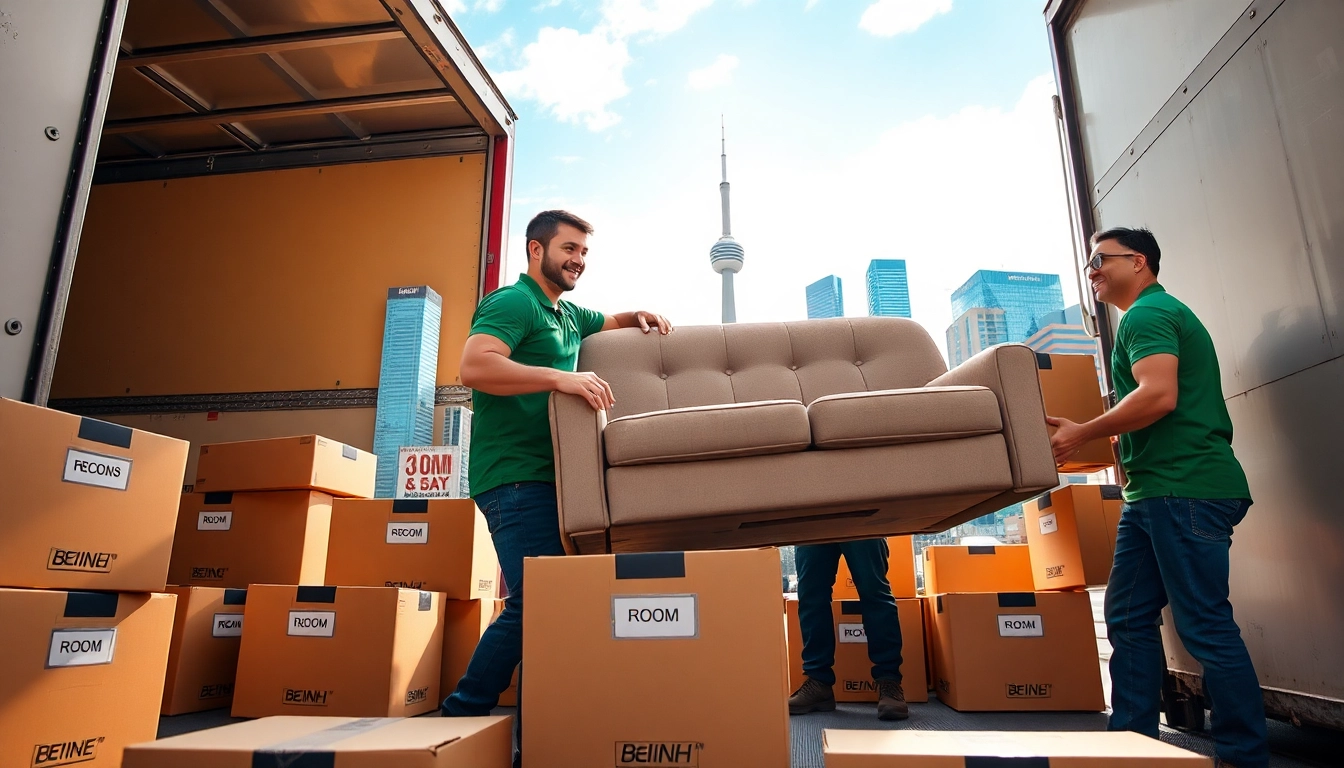Understanding Your Moving Needs
Moving to a new home or office can be both exciting and overwhelming. It is essential to take a step back and analyze your moving requirements. Whether it’s a residential relocation or a commercial shift, understanding your specific needs will lead you to make informed decisions throughout the moving process. Choosing the best moving company Toronto should be one of the key priorities when planning your move. This involves several steps geared towards identifying what you need from a moving service.
Assessing the Type of Move
The first step in your moving journey is determining the type of move you are undertaking. There are generally three categories of moves: local, long-distance, and international. Understanding the type of move is critical because it will influence your decision on the moving company you choose.
- Local Moves: These are typically within the same city or region, often involving short distances. Local moves usually cost less and take less time than long-distance moves.
- Long-Distance Moves: This type involves moving across states or provinces. It requires more planning and may involve additional services such as storage or packing assistance.
- International Moves: These moves are the most complex, requiring knowledge of customs regulations and international shipping protocols. If you’re moving abroad, be sure to choose a company experienced in international relocations.
Identifying Required Services
Once you have assessed the nature of your move, consider the services you’ll require. Moving companies often offer a range of services that can make your transition smoother. Here’s a list of common services to think about:
- Packing Services: Professional packers can help you carefully and securely pack your belongings. This service can save you time and ensure your items are well protected during transport.
- Loading and Unloading: Most moving companies provide labor to load your items onto the moving truck and unload them at your new destination.
- Storage Solutions: If you’re not ready to move into your new space immediately, look for companies that offer short-term or long-term storage facilities.
- Specialty Moving: If you have items that require special handling (like pianos, art pieces, or antiques), look for movers with experience in specialty services.
Budgeting for Your Move
A successful move starts with a solid budget. Moving expenses can vary dramatically based on the distance, time of year, and services required. Here are some tips to help you budget effectively:
- Get Multiple Quotes: Reach out to several moving companies to get detailed estimates. This will help you gauge the average cost and ensure you aren’t overpaying.
- Understand Your Pricing Options: Some companies charge by the hour, while others may provide a flat rate. Be sure to understand when charges may apply and what factors could raise the costs.
- Plan for Additional Expenses: Beyond the base price, consider potential additional costs like tolls, fuel costs for long-distance moves, or packing materials if not provided by the movers.
Researching the Best Moving Company Toronto
The next step in your moving process is to start researching potential moving companies. With many options available, it’s essential to carry out thorough research to identify the best moving company Toronto that suits your needs.
Checking Online Reviews and Ratings
Online reviews are a valuable resource when trying to gauge the quality of a moving company. Websites that aggregate customer reviews, such as Yelp and Google Reviews, can offer insights into the experiences of past clients.
When checking reviews, consider the following:
- Look for Patterns: If multiple reviewers highlight the same strengths or complaints, take note. Consistent feedback can indicate whether a company is reliable or if there are red flags.
- Evaluate Responsiveness: How does the company respond to negative reviews? A professional company takes negative feedback seriously and aims to resolve issues amicably.
- Moderate Reviews: Avoid relying solely on extreme reviews (either overly positive or negative). Look for balanced assessments that provide specific examples of what to expect.
Evaluating Services Offered
Not all moving companies offer the same array of services. As you evaluate potential moving companies, ensure they provide all the services you require. Create a checklist of what you need—such as local or long-distance moving, packing services, or specialty items moving—and compare it against the services offered by different companies.
Requesting Quotes and Estimates
Getting an accurate quote is crucial for budgeting your move. The moving company should provide a comprehensive estimate that considers all aspects of your move. Here are some steps to follow:
- Request an In-Person Estimate: Many reputable companies will offer free estimates that require a walkthrough of your current home. This approach allows the company to assess how much labor and resources will be needed accurately.
- Ask About Pricing Structure: Understand whether quotes are binding or non-binding, and ask about any additional fees that may apply.
- Check for Unforeseen Costs: Ensure there are no hidden fees or costs not covered in the quote, such as fees for moving items up or down stairs or additional charges for last-minute changes.
Understanding Moving Costs and Contracts
Once you have narrowed down your options for moving companies, it is important to have a clear understanding of moving costs and the contractual agreements you will enter with the chosen mover. Transparency is key to avoiding issues during your move.
Transparent Pricing Structures
Moving costs can very widely depending on several factors, including distance, size of the load, and services rendered. Here are key aspects to consider regarding transparent pricing:
- Fixed vs. Variable Rates: Some moving companies provide fixed rates based on a comprehensive estimate, while others charge by the hour. Understanding the pricing structure will help you anticipate costs better.
- Hourly Rates: If charged by the hour, get an estimate of how many hours the move might take based on the size and complexity of the move.
- Flat-rate Options: Many companies offer flat-rate pricing for long-distance moves which can provide peace of mind and predictability for budgeting purposes.
Common Hidden Fees to Look Out For
Many companies may have hidden fees that can catch you off guard. Here are some common ones to watch for:
- Fuel Charges: Be sure to clarify if fuel is included in your quote or if it will be charged separately.
- Stair Fees: Some companies charge extra if movers need to navigate stairs, so be sure to disclose any relevant details about your current and future locations.
- Extended Hold Charges: If there’s a delay in transferring your belongings to the new place, this might incur additional costs. Make sure you know about potential extra charges in such situations.
Understanding Contract Terms
Finally, before signing any contract with a moving company, ensure that you fully understand the terms. Read through all clauses, looking for:
- Liability Coverage: Confirm the company’s policy on damages and what liability coverage they provide. Are your items insured during the move?
- Cancellation Policies: Understand the cancellation or rescheduling policy should anything arise that affects your relocation plan.
- Timeframe Clauses: Ensure that moving times are clearly outlined so you know what to expect regarding delivery times and availability.
Preparing for Moving Day
As moving day approaches, it’s important to prepare in advance for a smooth transition. Being organized and having a clear plan can make the day less challenging.
Tips for Packing Efficiently
Effective packing is the cornerstone of a successful move. Here are some strategies to ensure you pack efficiently:
- Start Early: Don’t leave packing for the last minute. Begin at least a few weeks in advance for a calm and organized packing experience.
- Stay Organized by Room: Group items by room and pack them into labeled boxes. This organization will help streamline the unpacking process.
- Use Quality Packing Materials: Invest in sturdy boxes and tape to protect your items during transit. Don’t rely on flimsy boxes that may break.
- Consider Inventory Lists: Make an inventory list of packed items. This helps track everything and ensures nothing goes missing.
What to Communicate with Your Movers
Effective communication with your moving team can prevent misunderstandings and help them facilitate a smoother process. Here are some crucial points to cover:
- Access Information: Let your movers know details about parking, stair access, and any restrictions at both locations.
- Special Items: Inform them about any large, fragile, or specialty items so they can prepare accordingly.
- Schedule: Confirm the moving schedule to ensure all parties are on the same page regarding timing.
Final Checklists to Ensure Readiness
Checklists are invaluable for keeping track of moving tasks and ensuring nothing is overlooked. Consider creating a moving checklist that includes:
- Confirmation of the moving date
- Squaring away payments and contracts
- Gathering essential items for your first few days in the new home
- Notifying utilities and change of address for services like subscriptions and banks
Post-Move Considerations
After the move is complete, there are several aspects to consider that can help you settle comfortably into your new surroundings.
Unpacking and Organizing in Your New Home
Unpacking can often be just as overwhelming as packing. However, by adhering to strategic techniques, you can make it manageable. Here are some suggestions:
- Prioritize Essentials: Start with unpacking essentials—items you need immediately in your day-to-day life. This might include kitchen supplies, toiletries, and personal items.
- Room-by-Room: Try to focus on one room at a time to avoid spreading yourself too thin. This way, you can create a livable environment more quickly.
- Decorate as You Go: As you unpack, take time to set up your space to reflect your style. It can make your new place feel like home faster.
Providing Feedback to the Moving Company
Once your move is complete, consider taking a moment to provide feedback to the moving company you chose. Positive or negative, your insights can be valuable. Here are some ways to give feedback:
- Write Reviews: Consider leaving a review on platforms like Google, Yelp, or their website to help future customers in their decision-making process.
- Direct Feedback: If you experienced a significant issue or exceptionally positive service, consider reaching out directly to the company to share your thoughts.
- Utilize Social Media: If you’re active on social media, sharing your experience there can help others in your community.
Settling into Your New Community
Moving doesn’t just mean relocating your belongings; it also involves adjusting to a new community. Here are tips for making this transition smoother:
- Explore the Neighborhood: Take some time to walk around and discover local shops, parks, and amenities.
- Meet Your Neighbors: Make a point to introduce yourself to your neighbors. A friendly wave or a brief chat can help foster relationships.
- Engage with Community Events: Check local community calendars for events or gatherings. It’s a great way for newcomers to meet people.



